You’re not alone, Pandas—there are plenty of people out there who would love to be superheroes and to live a life of adventure. But bravery and a willingness to help others, though vital, aren't enough: you also need nerves of steel and to know what you're doing when there's an emergency.
Though it’s practically impossible to be prepared for every eventuality (and nobody should have to live in perpetual fear of something bad happening), it pays off to know what to do in dangerous situations. We’re featuring the most useful tips that redditors from all walks of life shared online, and these might potentially end up saving someone’s life in the future. They feel like everyone should at least be aware of their advice. Scroll down, upvote the posts you found the most enlightening, and let us know in the comments if you feel like someone has missed something important.
Bored Panda wanted to learn about how to react in emergency situations, so we reached out to the talented and hard-working team behind the Australian Firefighters Calendar, a project that raises money for various charities. We got in touch with the Director of the project, David Rogers, who passed our questions on to one of the most qualified firefighters involved with the calendar, Bruce Mitchell, who has been with the fire service for 30 years.
Meanwhile, when you're done reading this article, you’ll find some more clever tips that could one day save your life in Bored Panda’s earlier post right over here.
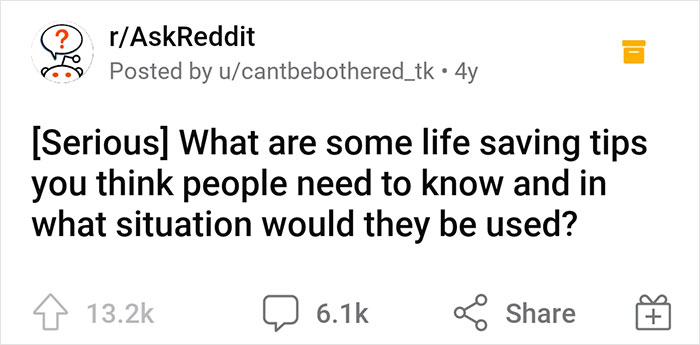
#1
Posted before but relevant here.If you see someone wearing a motorcycle helmet have an accident, DO NOT pull their helmet off for any reason. By all means, loosen the chin strap, but leave the helmet on and let the paramedics or doctors deal with it. You don't know what that helmet is holding together.
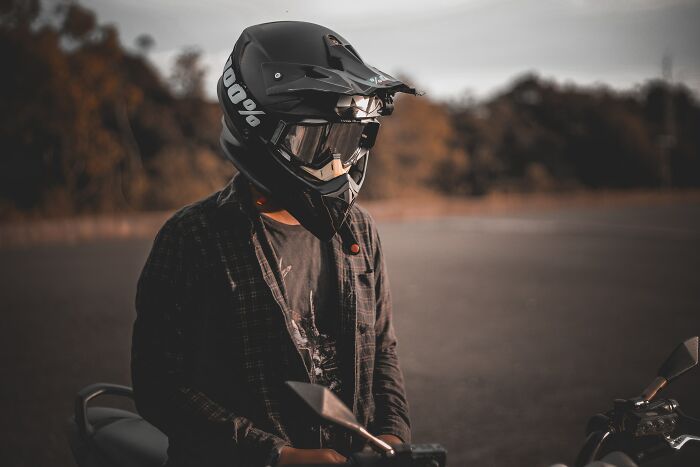
Image credits: TassieGal
Bored Panda wanted to know what someone should do if they wake up to find that their home is filled with smoke or they see fire. Veteran firefighter Bruce, a member of the Australian Firefighters Calendar team with decades of experience in the fire service, told Bored Panda that, first of all, it's vital to hit the floor.
"If you stand up in the smoke, you can be unconscious very quickly. Make sure everyone is safe in the house depending on the severity of the fire. Make sure you stay low and make your way outside the house. The priority is to have working fire alarms in your house, have them checked regularly," he explained what you should do in this type of emergency.
#2
If a service dog comes to you for attention, immediately locate their owner, they could be using a last ditch effort to get help.A few months ago when I was on a delivery for work, I was stopped by a dog who ran out in the middle of the road (residential). I got out and tried to move the dog, but it followed me all the way to the door of my delivery. Once I was done I checked the dogs tag to bring it home, and I noticed he had all kinds of medical tags. After I realized what the dog was trying to do, I ran towards the correct address and the dog led me through a screen door on the porch. His owner was passed out on the floor, and I called 911.
The individual had a phone (brought by the dog) by its head, and a bag of medications by his side. The dog had done everything it was trained to do, but the person had passed out before it could do anything. The ambulance came, got his pulse back, and took him to the hospital. I don't know if he ended up surviving, but if I hadn't checked the dog's tags and realized it was a medical animal, I wouldn't have hurried, blatantly invite myself in his house, and ultimately get him to a point of survival.
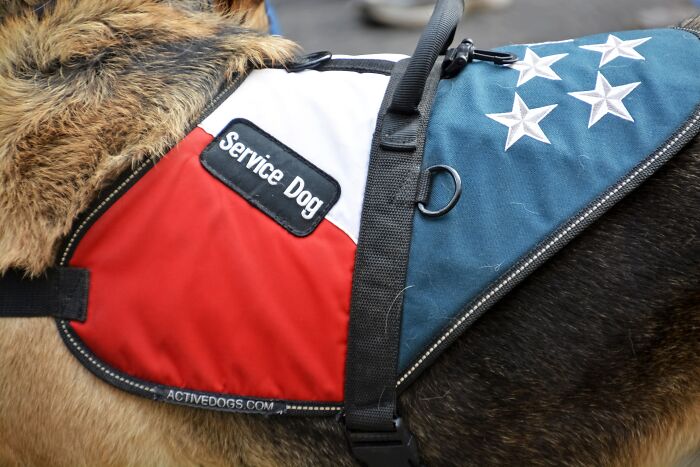
Image credits: Akhenatenaten
#3
If you fall into water, don't panic. You don't have to be able to swim; you just have to float. Hold your breath and let yourself bob to the surface.If someone is in trouble in the water, they will absolutely kill you in mindless panic. Bring something with you - a float, a rope, a towel - and use that to bridge the gap between you so you can tow the person in.
If you must make direct contact, come up from behind and slip your arm across the victim's chest. Pull the victim's back to your chest and keep his/her arms facing away from you. I've been in the deathgrip of a fat little 8 year old and he nearly took me out.
If a panicked drowner does grab you, do everything in your power to go down toward the bottom. Most will let go; that's the last place they want to go.
Recognize that even if you are both a strong swimmer and a trained rescuer, you are still risking your own life if you go to the aid of a swimmer in trouble. Take it very seriously.
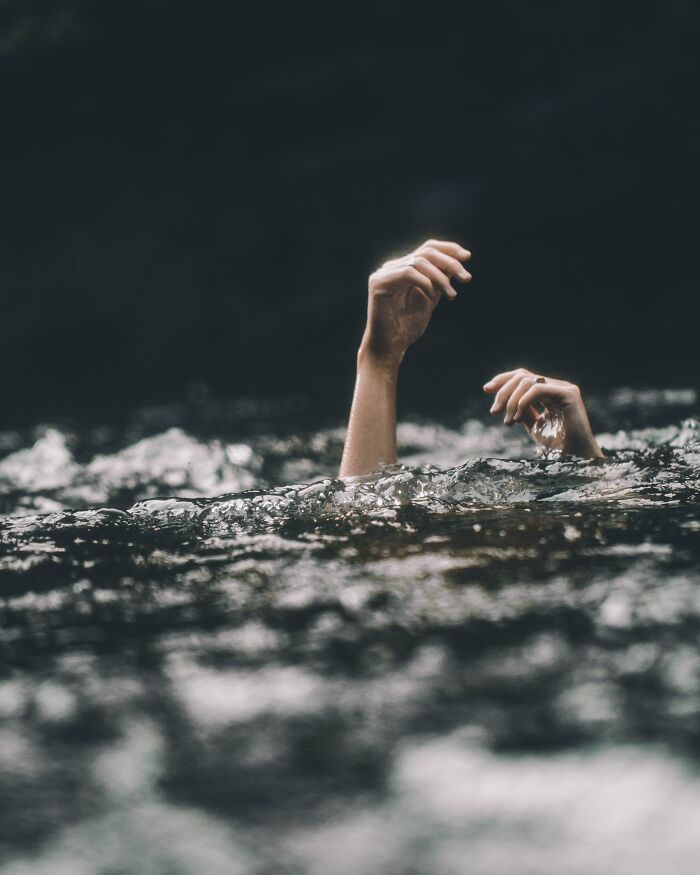
Image credits: IThinkThingsThrough
Meanwhile, Bruce also shared what someone should do if they see someone fall unconscious.
"The first thing to do is to make sure you and the person are in a safe environment. They may have lost consciousness for a number of reasons that might not be due to poor health, for example, a gas leak or a shock from an electrical current," he pointed out to Bored Panda.
"After you ensure the area is safe, call emergency services immediately. Then check for responses from the patient, see if they can communicate. If they are unresponsive and not breathing, start CPR."
#4
**Do not** pull objects (knife, glass, splinter etc) from a deep wound. They might be sealing or slowing flow from an artery or they might *cut* an artery when you pull them out.Put pressure *around* such an object to slow bleeding till emergency responders take over.
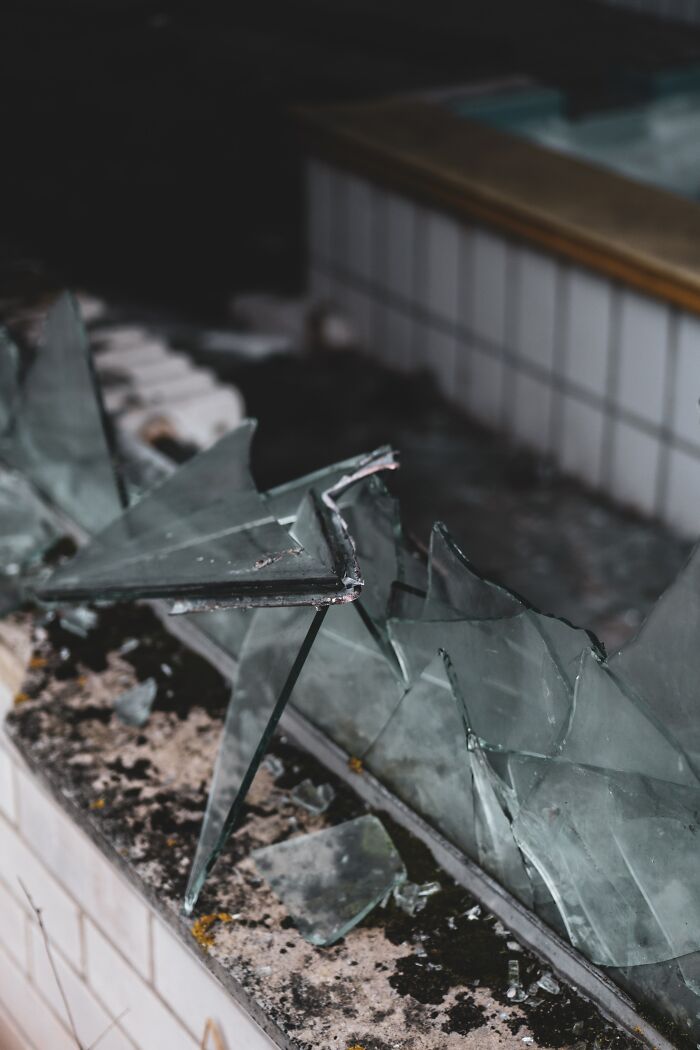
Image credits: A40
#5
A few survival tips for mainly the desert but also a lot of places.If you are lost in the desert, or a lot of places for that mater, the number one thing you can carry to increase your chances of being found is a small reflective mirror. Anytime a plane flies overhead you can reflect light towards them and you greatly increase your chances of being found. This seriously is more important than carrying more water with you (not that water doesn't help, its just not realistic to carry that much water on your back).
Furthermore, if you get stranded in the desert with a vehicle, do not leave your vehicle to find people. You are a lot harder to see than your vehicle and your car can provide shelter (your car has some good reflective mirrors to signal with, especially the rearview mirror). People die all the time doing this, often found only mere miles from their car.
Finally, the universal sign for needing to be rescued is waving two arms up and down. If you wave only one arm to a passing plane, you will not be helped, or at least are less likely to be helped. Also, because a few people have been wondering what to do if you can't use both of your arms, there is another universal way to signal for help that is more versatile. The way I can best describe it is three of anything quick signal. Three gunshots, three whistle blows, three flashes of a flashlight, three flashes from a reflective mirror, etc. Just make sure they are spaced widely enough (at least one second) and that you spend a considerable time before making your next three signals.
There have been many deaths that could have been prevented had this advice been followed.
Edit: added a little more information.

Image credits: RIPGeorgeHarrison
#6
If you're performing CPR on someone who's stopped breathing/heart has stopped, don't stop until EMTs take the body away. Don't stop after 2 mins thinking "Well that didn't work." CPR typically won't cause the victim's heart to suddenly start and or for them to jerk awake -- it's mostly to force blood circulation to prevent brain death. You're not forcing life into them; you're preserving a corpse to keep a 'reviveable' state.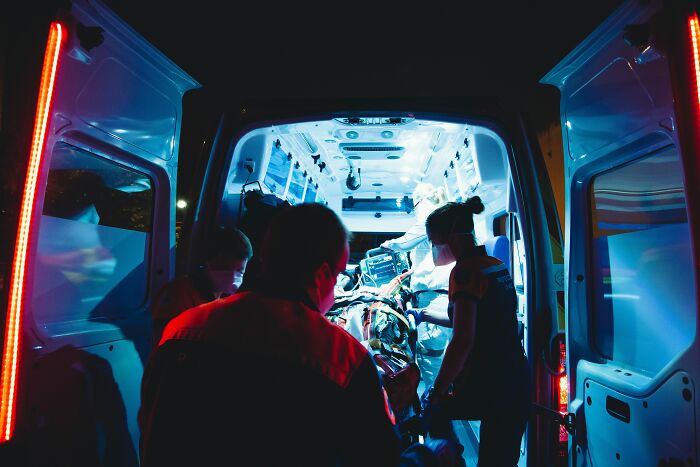
Image credits: blznaznke
Here at Bored Panda, we genuinely think that the people working in the emergency services are heroes. We wanted to know about what it takes to be a great firefighter, and whether it's more important to be mentally or physically tough.
"Mental resilience and physical toughness are equally important," the veteran firefighter stressed.
"A major contributing factor to being a successful firefighter is the ability to assess the situation quickly. Things can happen extremely fast at a fire or an accident, you must be able to act and think at the same pace," Bruce said. "It is also important to possess problem-solving abilities in high-pressure situations."
The veteran, who's involved with the Australian Firefighters Calendar project, added that it really helps if you come from a well-rounded background before joining the fire service. "Farmers, builders, and construction workers, people that have worked with their hands make fantastic firefighters. Physical strength and endurance are also a vital component in a rescue situation."
#7
It's likely too late for anyone to see this but hopefully this helps a few: nuclear warfare is a serious threat that hasn't been mentioned yet. The following was common knowledge during the cold war era, but most people my age don't know what to do in a nuclear disaster. In a nuclear explosion most of the damage and death is caused by the shockwave the blast creates, not the fireball which has a comparatively small radius. One day you may find yourself outside or looking out a window to see an extremely bright flash. As bright as if you were staring straight at the sun. Do not attempt to locate the source of the flash. You have maybe 8-10 seconds to respond if you're far enough away from the fireball. Lay face down on the ground and put your thumbs in your ears and fingers over your eyes. Breathe through your teeth. Since you're laying face down the shockwave will mostly pass over you. If you're standing up it can cause your lungs, eardrums, and other organs to explode. Once the shockwave passes over you, you need to find shelter immediately. I said before that most death from the explosion is caused by the shockwave. Well, FAR more death is subsequently caused by nuclear fallout AFTER the blast. Do not attempt to travel anywhere. Just get underground. If you're next to a complete stranger's house or a business, don't hesitate to go inside and hide out under as much concrete and steel as possible. You need to remain in this location for the next 48 hours. This is critical. Even if you survive the blast if you attempt to go home and spend just 20 minutes outside traveling you will more than likely die of radiation sickness. Radioactive material after a blast decays exponentially and you will be safe to try and find your loved ones after 48 hours. If you don't wait this out, you definitely won't be alive to find them. When you're ready you need to leave the city and get as far from the fallout as you can.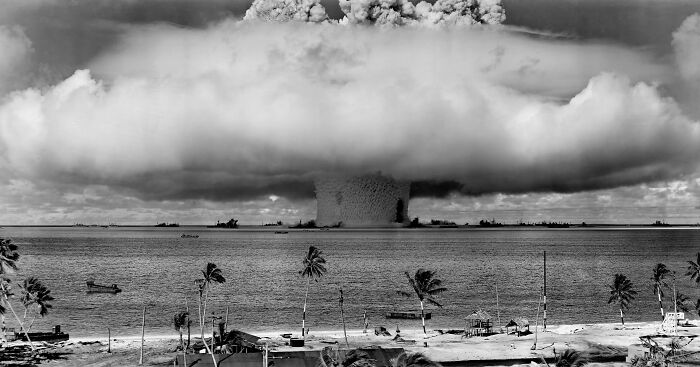
Image credits: rasmeverson
#8
A person who is drowning doesn't look like people drowning on TV. When someone is drowning they rarely cry out, can't wave their arms around, and will often just bob/sink at the surface for a very little while, often gasping, before submerging.Don't expect it to look like the movies when you're keeping an eye on swimmers.
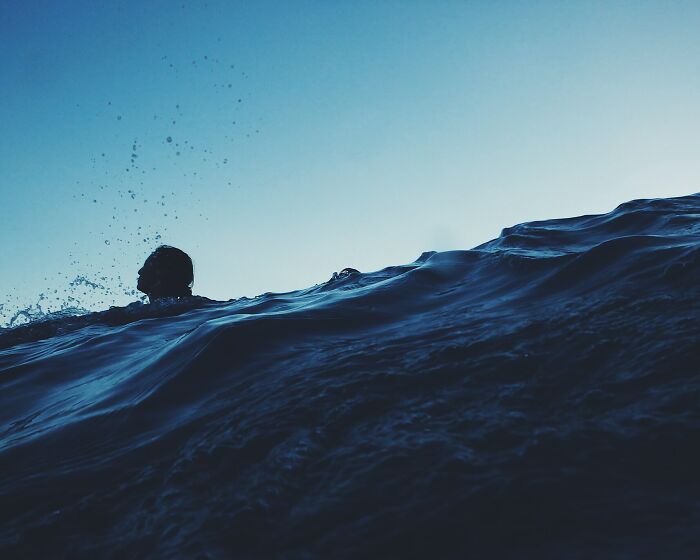
Image credits: flora_poste_haste
#9
If you ever get lost, the first thing to do is stop moving. Sit down, stop freaking out, and think. If you give in to panic and lose your head, you can screw things up so badly for yourself that help will never find you.Remember the rule of three:
Starvation will kill you in three weeks.
Thirst will kill you in three days.
Cold will kill you in three hours.
Lack of oxygen will kill you in three minutes.
Panic will kill you in three seconds.

Image credits: anon
The essentials in any emergency are very simple. Don’t panic. Call for help. Trust your gut. If you start panicking, you’re far more likely to make decisions that can end up hurting you in the end.
Of course, it’s easy to tell someone not to panic—staying calm when there’s a lion heading towards you or when you wake up to the house on fire is incredibly difficult to do in practice. Your fight or flight instinct is kicking in. Try to control your breathing to calm yourself. It also pays off to live a healthy lifestyle and be physically fit so you're more likely to survive accidents and help others in need.
Depending on where you live, the emergency services number will be different. You should definitely know it by heart. Those of you Pandas living in the United States, Mexico, and Canada should call 911. If you live in the UK, dial 999; if you happen to be based in Australia, dial 000 (aka ‘triple zero’) and the operator will ask, ‘Police, Fire, Ambulance?’
Those of you Pandas living in the European Union will most likely call 112. The number also works in India. In short, if you see someone in danger or you need assistance, call for help ASAP. Do it yourself, don’t expect others to call in your place.
#10
Kids don’t float. For a number of reasons, kids aren’t as buoyant as adults. Kids should always wear a life vest when in a boat of any sort, as well as when playing around streams, ponds, lakes, oceans etc. A small child can drown in no time. In many places there are laws requiring kids to wear life vests in boats. Where I live, vests are also required at public recreation areas. Fire departments even have free loaners.Those inflatable arm band floaies/wings aren’t sufficient. They can easily slip off or the kd will take them off. They can pop. They also give adults a false sense of safety and not watch the kids closely enough.
And, don’t forget that a drowning kid may be perfectly silent—no thrashing around or crying out; just quietly not breathing.
Never take your eyes off a small child in the water. Period.
#11
If you are caught in an active shooter situation and you are unable to run away or hide, start throwing things at them. It is incredibly difficult to be accurate with a firearm with someone throwing stuff at you. Even small things flying toward you triggers your desire to avoid the object and dodging something while simultaneously shooting accurately is almost impossible. A thrown stapler or keyboard might buy you enough time to either rush the attacker or escape somewhere.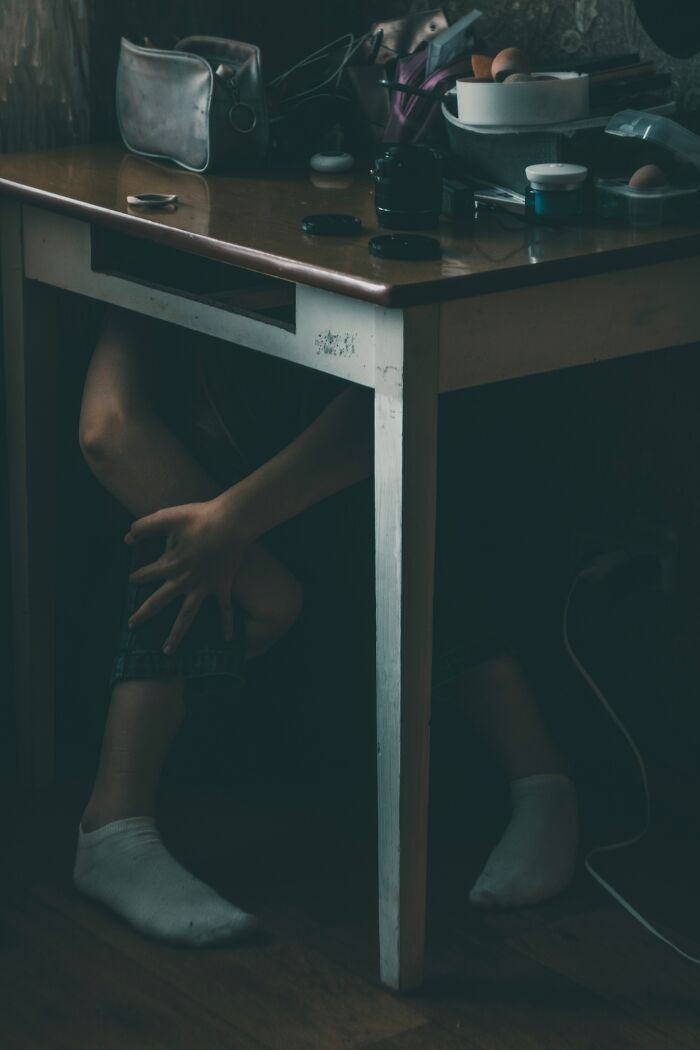
Image credits: SardonicWhit
#12
If you find yourself hurt in a public place, direct your pleas to one person, not to the crowd cause everyone will think ”somebody else will help you”. It is called the bystander effect
Image credits: ami_toonaive
When you see an accident and there’s a crowd of onlookers, odds are that you’re likely to think that someone already phoned the emergency services. However, that’s where the bystander effect comes into play.
When there are other people around, you might feel discouraged from intervening in an emergency situation. In other words, you’re less likely to help someone in distress because you assume someone else will (or already has).
“People are more likely to take action in a crisis when there are few or no other witnesses present,” Psychology Today notes.
The bystander effect isn’t related just to passiveness. It’s completely natural to freeze up when there’s an emergency. “This is usually a response to fear—the fear that you are too weak to help, that you might be misunderstanding the context and seeing a threat where there is none, or even that intervening will put your own life in danger,” Psychology Today explains.
#13
If you EVER need to break your car window - all headrests detach and can the metal ends are meant to be used to break the glass. Helpful if you are in a sinking car.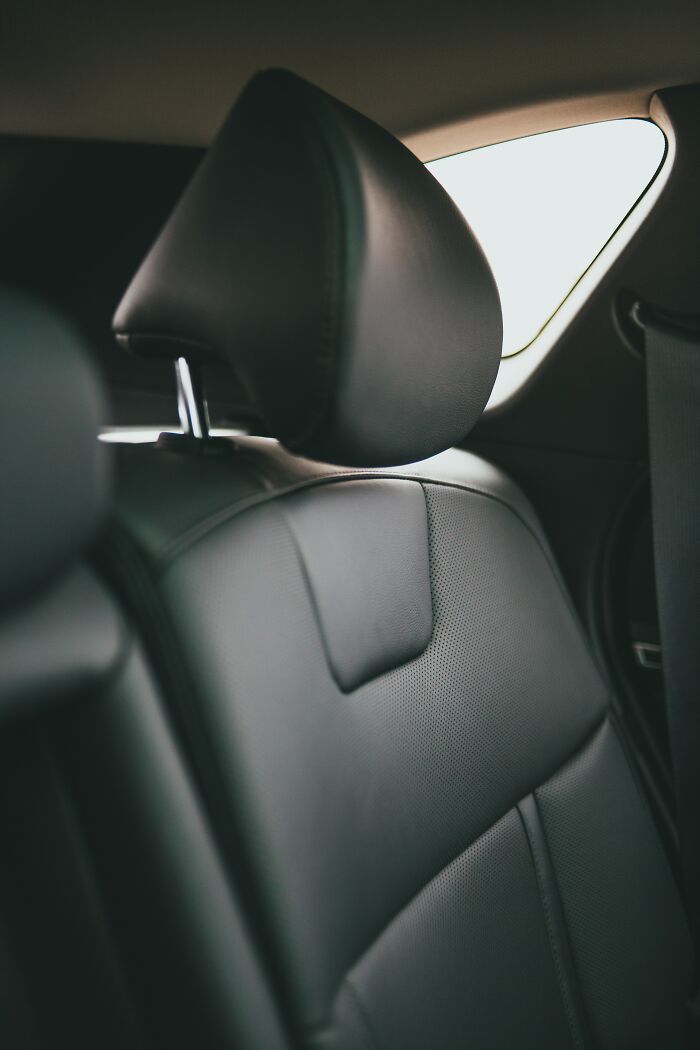
Image credits: gopher33j
#14
Buy a plunger and fire extinguisher before you need a plunger or fire extinguisher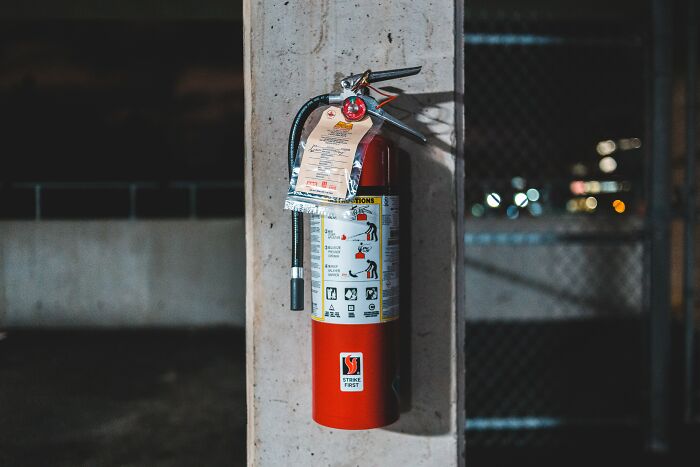
Image credits: benbernards
#15
If someone grabs your wrists, pull away quickly where their thumbs are - thumbs are the weakest parts in a grip.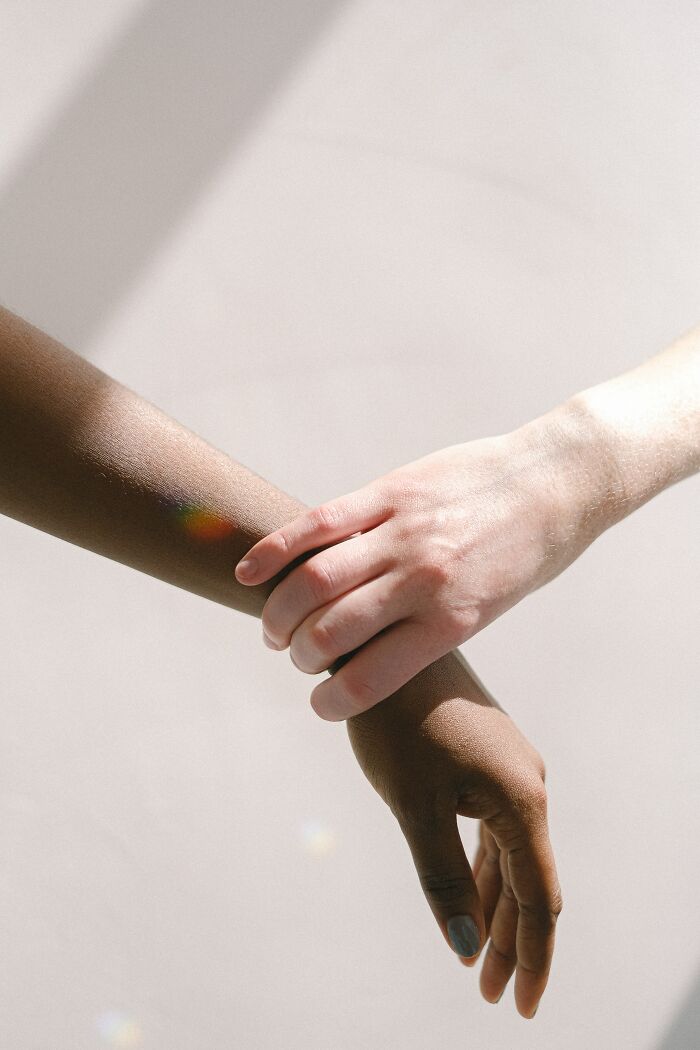
Image credits: anon
One way to ‘break the ice’ in these sorts of situations is to say something aloud. Asking someone what’s going on or even stating that you’re calling the police or the medics can get the ball rolling. Others might feel emboldened and start doing something to help, too. In these situations, taking action (even if it’s minuscule) is essential.
Be a leader. Speak, even if your voice shakes. Being an everyday superhero doesn’t mean fighting off evil robot invaders from outer space; it usually means finding the courage to help someone in need, even if you think your help barely amounts to anything. And if you know what to do in situations where someone’s drowning, unconscious, or has hurt themselves, then you’ve got an advantage compared to all the other bystanders. What you do, how you react, matters.
#16
Don’t text/drink and drive.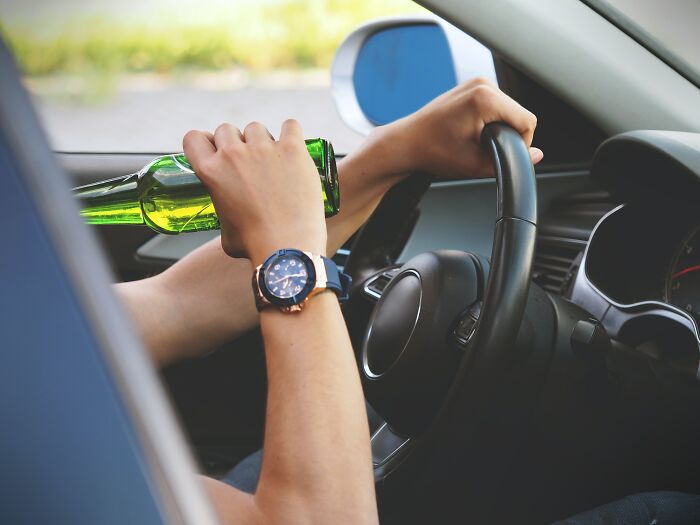
Image credits: NLJeroen
#17
Student paramedic here! So many people know how to give CPR and that's amazing! But if you ever get into the situation with a baby, please do not tilt their head back. You will occlude their airway. It's heartbreaking to tell parents their child is deceased when they thought they were doing the right thing.#18
Beware of a stranger who says "I'm not going to hurt you " If you someone feels the need to say this, they are thinking of hurting you. Trust your instincts if you feel there is danger in a situation, there probably is. Don't let politeness or fear of embarrassment put you in danger. Source: "The gift of fear." Very interesting and useful book. Highly recommended.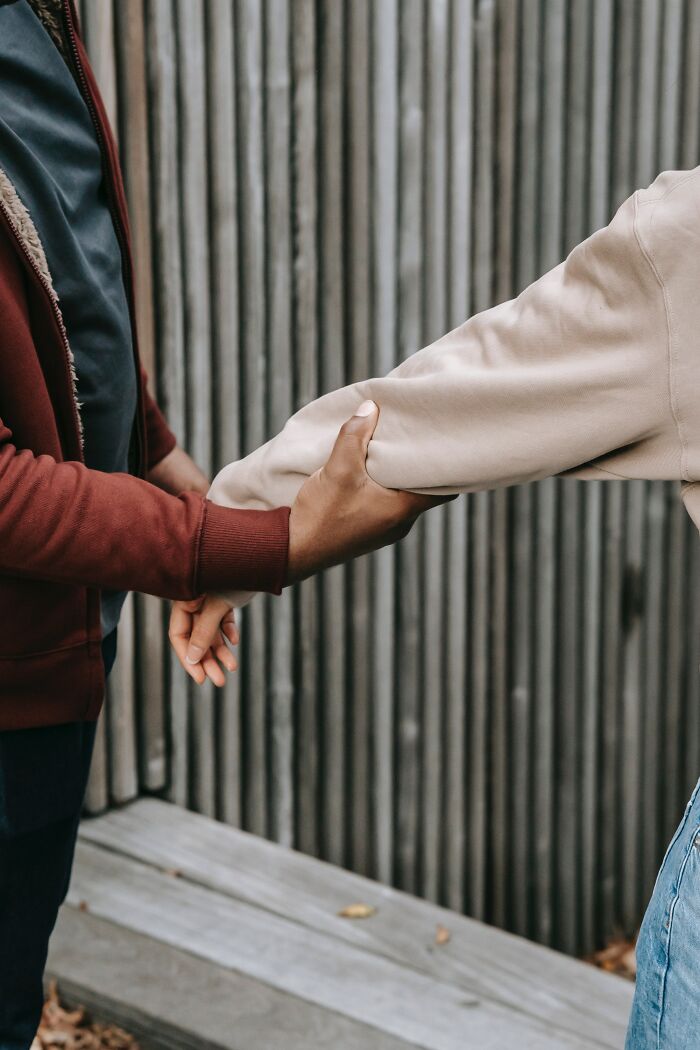
Image credits: warmhandswarmheart
#19
If someone is choking but they are coughing/talking, DO NOT INTERVENE. Let them cough it out. The ability to cough is a sign that air is able to get in and out and that they only have a partial obstruction in their airway. If you try to intervene with the Heimlich or backblows, you *could* force it out, or you could dislodge the blockage and cause a full obstruction.Obviously, if they're not breathing or coughing then you should definitely administer backblows, just remember to check in between each one incase you partially dislodge the object.
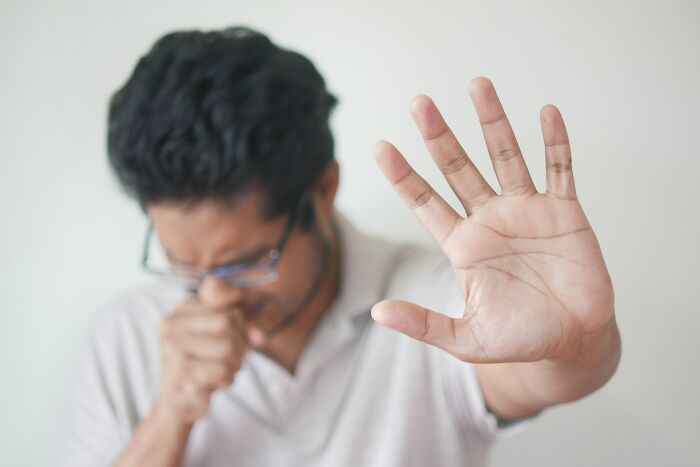
Image credits: Loubang
#20
If a known diabetic person faints/gets dizzy, give them something sugary immediately.If they got sick because of high sugar levels (hyperglycemia), the repercussions of increasing their sugar won’t be as terrible as the damage caused if no action is taken. Giving that little amount of sugar (if they fainted due to a hypoglycemic episode) can be life saving!
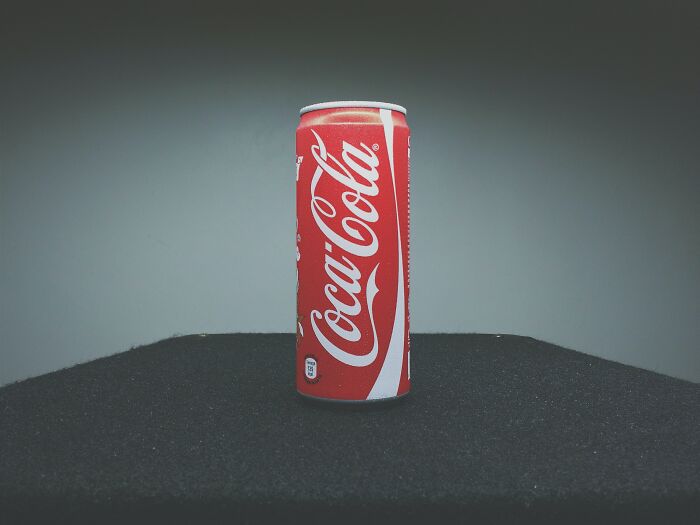
Image credits: loveallthingskawai
#21
If you're outside in a lightning storm and your hair starts floating, seek immediate shelter. You're about to be struck by lightning.If immediate (within 15 seconds of movement) shelter is not available, put both your feet together, squat down on the balls of your feet, and grab your ankles. If you're struck, this will give the lightning a direct path down to the ground and hopefully minimize damage.
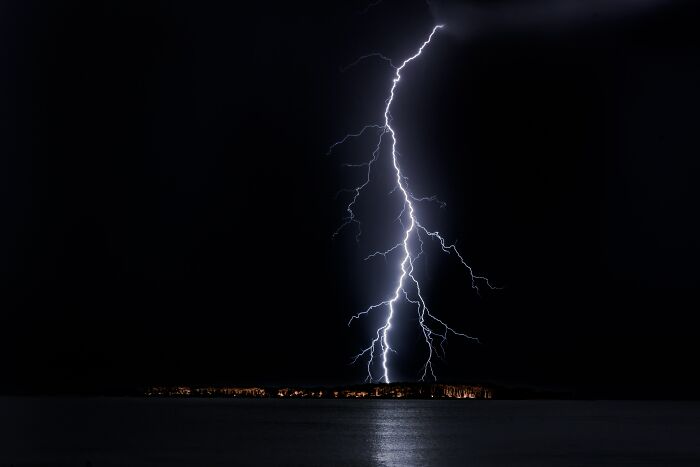
Image credits: Deodorized
#22
This is for driving on snowy or icy roads.If you ever start skidding DO NOT BRAKE. That will only lock the tires and f**k you harder. What you need to do is take your feet off the pedals and steer with the skid until the tires find grip again.
#23
Never talk to the police without a lawyer. Just give your name, address and dob. Otherwise don’t say a word.It might not keep your heart from stopping but nothing ruins a life faster than prison. Even a conviction can stop you from getting work or being able to travel.
*also don’t commit crime. But since being innocent doesn’t guarantee that you won’t be charged/convicted the above still applies.
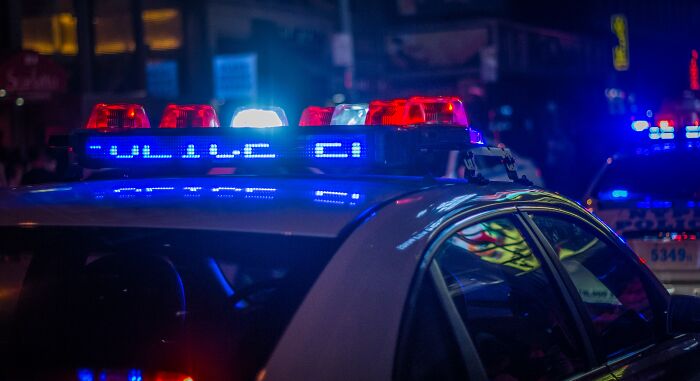
Image credits: pecrh001
#24
When walking in big 5 territory, if you encounter lions, DON'T RUN. If they come towards you, growling, it's to say you are too close but they will not attack you. Just walk away slowly and don't lose sight of them. Or stand your ground. Intelligence is your biggest weapon then; shout and clap your hands and they will run away.Source; am Kruger wildlife guide, with more than 10 encounters with wild lions in the last year.
Seriously; DON'T RUN
#25
When you go to a beach read the signs. I live in Australia. We have too many beaches to patrol them all. They have signs they tell you what may be wrong with that beach. Read them and take them seriously.Just because a beach looks nice doesn't mean you should just go jump in.
#26
If you get caught in a rip current, swim horizontally / parallel to the shore at the fastest speed you can comfortably maintain. Don't worry that you're going further out. Eventually you'll be out of the current and can slowly head back inland. Try to swim against it and you'll just tire yourself until you drown.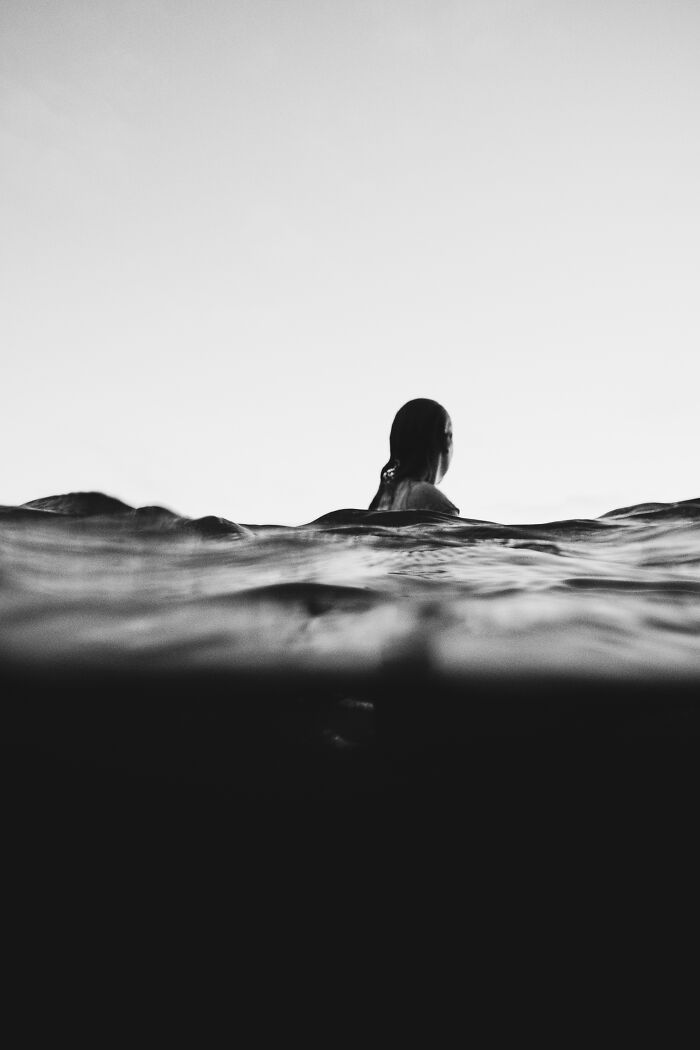
Image credits: TheMotorcycleBoy
#27
I think the overall thing to keep in mind is that in high-stress moments you will not rise to the occasion, but you will sink to your level of training.Like Mike Tyson said, "Everyone hath a plan until they get punthed in the mouth."
Edit: Changed punched to punthed for more authentithity
#28
Tips for cold weather.Dress in layers-holds heat in better.
Stay dry.
Protect your feet,hands,and face.
If you plan on going long distances have a plan to move on top of the snow and let people know where you are going
Never go on ice unless it is at least 4” thick. 6” if you have a snowmobile. 8” for a small car. 12” for medium trucks.
Clear ice is stronger than “snow ice”
Always watch for signs of frostbite and hypothermia.

Image credits: hungryamerican
#29
If you’re outdoors in the heat and you stop sweating, you’re in trouble. You need to hydrate and get the f**k inside and if you can’t keep water down, go to the hospital or urgent care for an IV. You are SEVERELY dehydrated and at high risk for a heat stroke. You should always be sweating if it’s hot and you’re doing strenuous work.In the same vein, never ever drink ice cold water when you’re hot. You need to drink room temperature water.
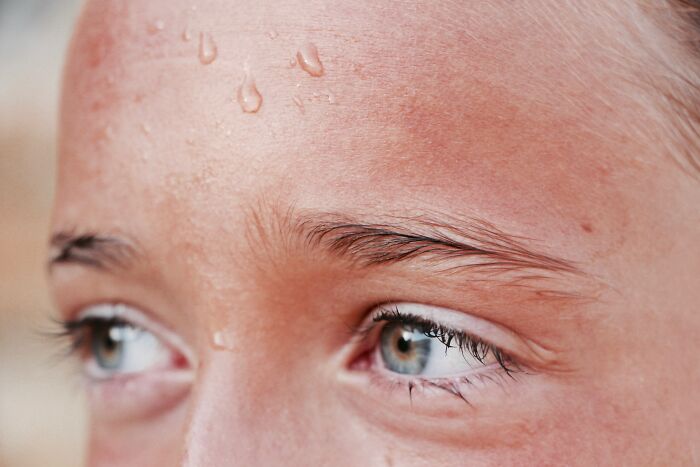
Image credits: Dirt-McGirt
#30
Carry a basic first aid or emergency kit in your car on your person/work/home. Everyone laughs at me for this. (I have a kit I added a whole bunch to. Mylar, little snacks, etc) not just for doomsday prep but imagine you get stranded in a storm or snow. Or like a comment above mentions a desert. Having some water, food, mylar blankets, and some others could very well save your life until you can be rescued.Not only this but my work first aid kit sucks. (Legit. Some tiny bandaids and a few alcohol wipes) I've gotten bad wounds that weren't hospital/go home worthy but would have been a b***h to go the rest of the shift without a bandage.
My little sister had a bad bug bite. They weren't laughing when I had sting relief.
My co-worker forgot her lunch. I gave her one of the bars, a fruit snack and shared some of my lunch.
#31
Been to a fair few places and the one that kept me from harm most is "always be aware of your surroundings". Seems common sense but you can't only imagine the number of people who might have escaped harm were they a little more attentive to the world around them. In any place, in any situation, focusing less on yourself and more and what's going on around you will keep you alive longer than just about anything.#32
Don't inflate the life jacket under your seat on a plane until you exit it. If the plane fills with water you will only be making it more difficult to escape.#33
When you're making a turn across oncoming traffic, keep your wheels pointing straight ahead until the opportunity comes for you to make the turn. If your wheels are facing into the turn and someone hits you from behind, they will push you into the oncoming traffic and dead you will go.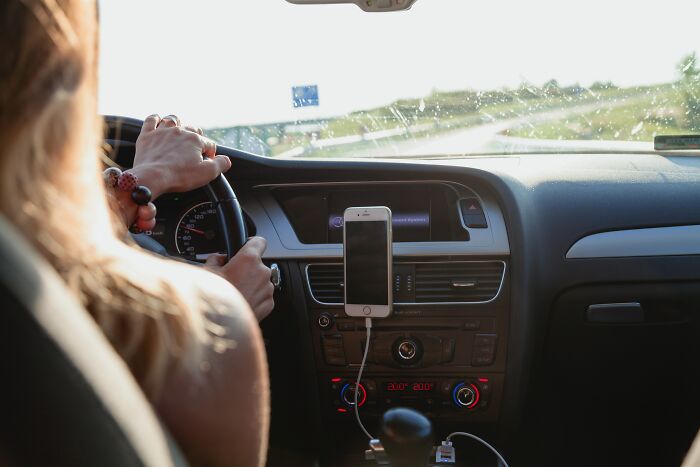
Image credits: TheMotorcycleBoy
#34
Know where you are.* Are you at home? Know your address. (Some people don't, believe it or not)
* Are you at work? Know your address.
* Are you at the store or other business? Know where to find an employee, they know the address.
* Driving? Know exactly where you are (street name, direction of travel, intersection, mile marker, etc.)
* Hiking? Know which trailhead you started at and which trail you're on, at the very least.
911 cell phone location technology is good to within 50 meters. That's 50 steps, which could put first responders at the house or business next door.
Imagine you're in an emergency situation that's rapidly changing (domestic violence, active shooter, carjacking, etc.). You call 911. The first thing out of your mouth should be "I'm at [location]." That way, if you must hang up for some reason, 911 operators will know where you are. They'll send police to check it out, and get you the help you need.
#35
if you go hiking always tell someone where you are going and when you should be back. When you arrive leave note on your dashboard that says where you are going and expected time back.If you realize that you are lost and can't reasonably find your way back to a trail stay put. it is common to watch survival shows where they say follow a river or a fence so that you find people, but this often ends up in death. common search techniques benefit more from you not moving so they only have check each area once.
#36
Use salt for grease fires or at the very least do NOT use water.#37
You can push kick a threatening person in the kneecap and if you hit squarely they will collapse 100% of the time regardless of size.#38
How to swim. Especially in young teens. Coming from a very heavy swimming [competitive, leisure, coaching] background, I’m absolutely floored and outraged when someone drowns not because of an undercurrent or exhaustion or some unfortunate incident, but simply because they were never taught HOW to swim and didn’t know how to respond to water. Absolutely disgusting. People aren’t inclined to naturally learn how to swim, in fact water [deep water] is a fear that causes a lot of people to panic. I can’t say much about adults who may have gotten through their younger years without ever learning and now never think about it or just never consider it important, that’s their decision at the point. But you’re doing yourself and your child a disservice if you don’t teach them how to at least float, tread water, and some type of swimming technique whether front crawl, breaststroke, etc.#39
If you’re being tied up, puff yourself out as much as possible so it’ll be easier to wiggle out of. Tense muscles, inhale deep and stretch out your arms and legs to make more space.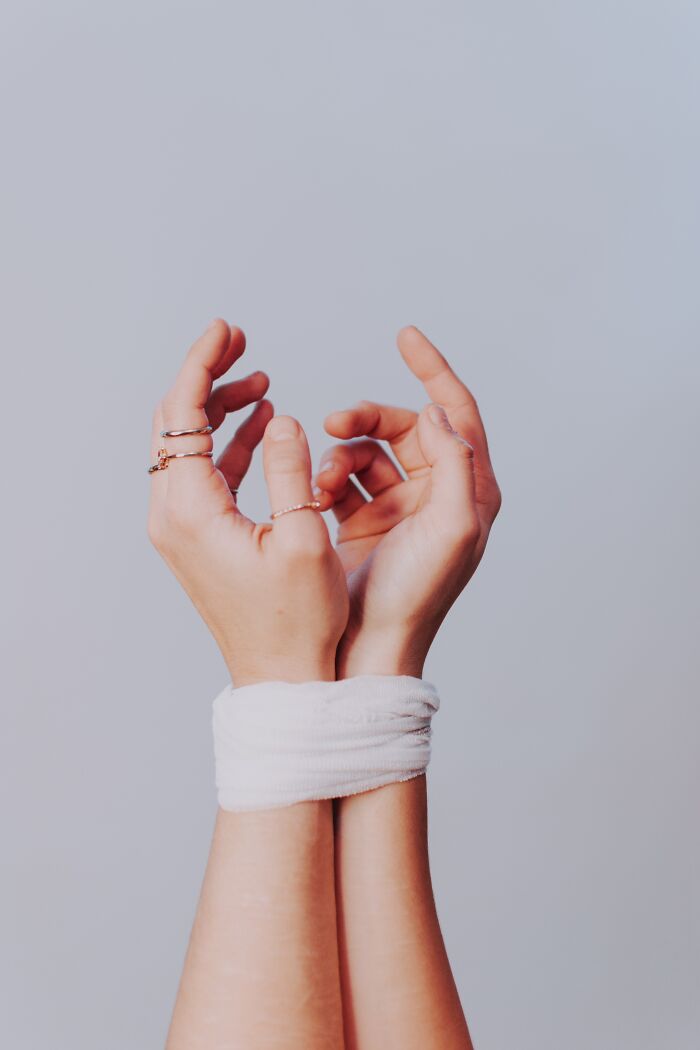
Image credits: snazzypurplefish
#40
In the US (and I think some other Western countries), you can notify your Department of State that you are going overseas for free (i think it is the smart traveller program). This means in event of a natural disaster/political issue/etc , they will know you need evacuation. They also update you on the state of the country as time goes by so you don't accidentally collide with some trouble. A lot of accidents happen just by being in the wrong place at the wrong time, so if you're travelling, it might be worth looking into.
Image credits: Ok_Elderberry
#41
If your car breaks down in a remote area cut off from civilization, stay with it. To draw attention, burn a tire during daylight. Somebody is likely to see the thick, black smoke.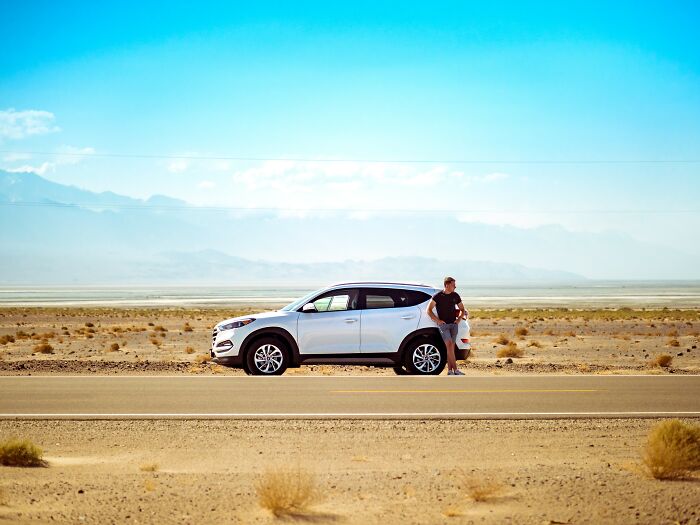
Image credits: Scrappy_Larue
#42
Learn a proper backstroke. Not only is it pretty efficient, it can save your life.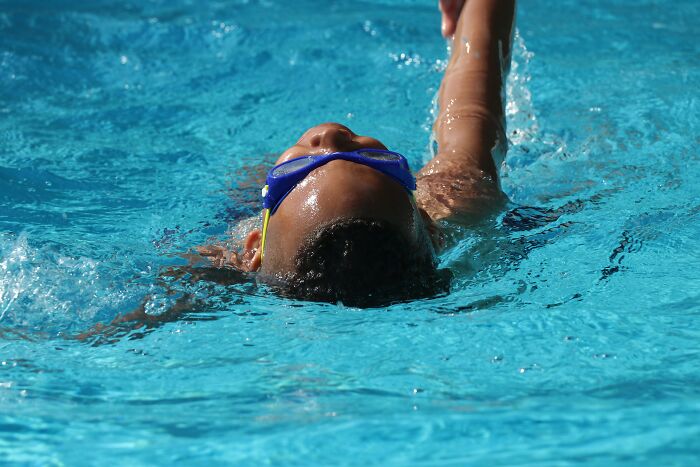
Image credits: bigwilly311
#43
I had a friend get lost and go down a logging road and get snowed in. She was reported missing for several days. When they found her, she’d managed to keep herself alive by packing the single water bottle she had with her with snow, placing it on the roof of her car, and waiting for it to melt. Then she’d drink and repeat. If she hadn’t thought to do this, she’d be dead. She had frostbite on her toes but after several weeks of physical therapy made a full recovery.#44
If you're stuck in a stampede.As soon as you get knocked down your chances decrease significantly. If this is the case, however, and you can’t get up immediately, assume a protective posture with your feet tucked up and your hands covering your head. Try to position your face in the direction the crowd is moving so you don’t get kicked and try to get back on your feet ASAP.

Image credits: Ammadu_LetsdoKummudu
#45
Look left and right twice before you cross the road and never cross the highway.#46
If you think you're being followed turn right four times. Since you'll get to the same place they shouldn't be following you anymore. If they do, you might be in trouble.Since it's a common warning that you shouldn't go home when you think someone is following you, the smartest is to go to a police station.
-
If someone is beating you and you can't resist the best is to lie on the ground and cover your head. This is usually known because it obviously protects the most important place in your body but it is also important because it will make the aggressor feel guilty and probably leave you.
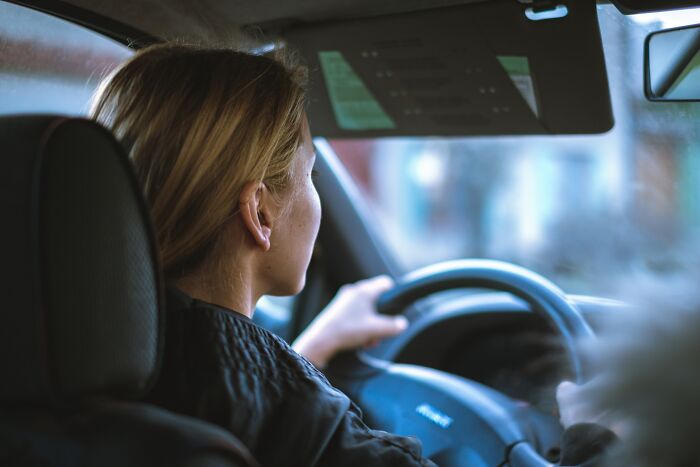
Image credits: MentLDistortion
#47
If you work around stuff that can cut someone easy (metal scrap, sheet metal or really any factory or construction work) wear a belt. IDC if you dont need one to hold your pants up. A belt can be a quick easy tourniquet and save a life.Source: my belt saved a life.
#48
Something I've seen on Reddit before, when getting a new home/apartment get a carbon monoxide detector, they're cheap and can save your life.#49
If it's brown lie downIf it's black fight back
If it's white you're f****d.
For bear encounters. I've met so many casual hikers in bear country with no idea there's bears in the same woods as them.
#50
How to fall properly.This isn't given much consideration, but learning that there are proper ways to fall can save you from serious injury or death.
#51
If you get stuck in an avalanche and find yourself buried in snow, spit a wad of saliva out of your mouth. Gravity helps you to determine which way is up and down, so you can dig yourself upwards. People get disoriented and dig in the wrong direction and tire out, which you can't afford to do.#52
If a car is tailing you, DO NOT go home. Go to a police station or somewhere public. They’re less likely to do something to harm you, and they won’t know where you live.#53
You should go to the hospital immediately if you feel sleepy after a head injury. People have died because they tried to sleep off those types of headaches. I learned this from reddit.#54
F.A.S.T. which is a way to identify if you or someone else is having a stroke.**F**acial drooping: A section of the face, usually only on one side, that is drooping and hard to move. This can be recognized by a crooked smile.
**A**rm weakness: The inability to raise one's arm fully
**S**peech difficulties: An inability or difficulty to understand or produce speech
**T**ime: If any of the symptoms above are showing, time is of the essence; call the emergency services or go to the hospital
#55
Always seek help from close friends and family whenever you are depressed. Even just talking to them helps, whether you want to talk to them about what is going on or simply finding a distraction from your situation. Relying on only medications and keeping it to yourself may worsen your depression and make you feel like no one is there for you.#56
Don’t be a polite victim.You’re probably a nice person and want to behave within society. But if you’re being mugged it’s because the bad guy doesn’t care about kindness nor does he deserves yours.
Shout, run, make sure everyone around you know what’s happening, say out loud what you think the mugger intentions are, don’t be afraid of making the mugger uncomfortable, that’s the point.
Once there’s at least one persone aware of the situation (that’s not you nor the mugger, of course) f*****g run.
#57
Pay attention to your gut and natural intuition. If you feel like you're in danger, it's because you're in danger, even if you can't quite articulate why. If a person seems sketchy or threatening, it's because they are. Intuition is finely developed by evolution, and generally speaking it will only fail you when you mindf**k yourself and deny it in order to appease an extremely modern sense of political correctness.Read "The Gift of Fear" by Gavin de Becker. Frequent pre-victimization indicators displayed by predators include:
-Forced Teaming. This is when a person implies that they have something in common with their chosen victim, acting as if they have a shared predicament when that isn't really true. Speaking in "we" terms is a mark of this, i.e. "We don't need to talk outside... Let's go in."
-Charm and Niceness. This is being polite and friendly to a chosen victim in order to manipulate him or her by disarming their mistrust.
-Too many details. If a person is lying they will add excessive details to make themselves sound more credible to their chosen victim.
-Typecasting. An insult is used to get a chosen victim who would otherwise ignore one to engage in conversation to counteract the insult. For example: "Oh, I bet you're too stuck-up to talk to a guy like me." The tendency is for the chosen victim to want to prove the insult untrue.
-Loan Sharking. Giving unsolicited help to the chosen victim and anticipating they'll feel obliged to extend some reciprocal openness in return.
-The Unsolicited Promise. A promise to do (or not do) something when no such promise is asked for; this usually means that such a promise will be broken. For example: an unsolicited, "I promise I'll leave you alone after this," usually means the chosen victim will not be left alone. Similarly, an unsolicited "I promise I won't hurt you" usually means the person intends to hurt their chosen victim.
-Discounting the Word "No". Refusing to accept rejection.
#58
Always keep a small fire extinguisher in your car.#59
If a grazing animal(horse, cow, deer...) goes to kick you move into them not away, it takes most of the force out of their strike and also puts it lower down on your body.#60
If I'm having a seizure, don't move me, wake me or try to stick a spoon in my mouth.Instead, start timing it, move things out my way and ring an ambulance* if it's the persons first seizure/you don't know them.
* this doesn't apply for me as I have them so often. Only if I go blue or it's over five minutes. If you know someone with epilepsy, ask them what to do in their case.
When someone comes round from a seizure, they are usually confused and dazed. They may have memory loss and not be sure where they are or who you are. It's okay to say "you had a seizure but everything is okay. I'm such and such, your friend/husband/random stranger, and you're here at X place."
Edit: if you want to find out more about epilepsy, I recommend Epilepsy Action. They're a UK charity
Here's the page on different types of seizures, [here's](https://www.epilepsy.org.uk/info/seizures-explained) more than just the type we see on TV!
#61
I live near the Gulf of Mexico. At the end of one of our beaches, there is a waterway with a heinous rip current. There are signs everywhere, in many languages, warning people not to get in that water. To stay off the jetty. Every single year people drown there because they ignore those signs. I was there every day last week and each time there were tourists climbing on the wet and slippery jetty despite the signs and the obviously wild water. My tip is for people to obey warning signs. They are there for a reason.#62
For the love of god if someone is having a seizure DO NOT put a spoon or any other object in their mouth to 'prevent them swallowing their tounge'#63
As a chemist there is one simple Rule: always Run away from Brown Gas its either Brom or a nitrogenoxide and both are highly toxicAlso all acid burns can be washed out with enought water (exept flouric acid but everyone Who handles this one knowes the Antidote for it and if you dont have it you are dead anyways)
Edit: I am talking about high concentrated acids, because low concentrated acids Do nearly no harm or react very Slow
#64
Check if your state sells Narcan without a prescription. That s**t is like magic. I buy em and give em to the guys I work with, lot of drug abuse in the construction industry. I've personally had to use it twice, and both times I was far enough from anything approaching civilization that the person would've been a goner. But be aware, there is a time limit! After administering, they will still require fairly immediate aid, although you can redose if you need to.#65
You can use emergency sos on your iPhone by hitting the lock button 5 times, or using your Apple Watch.You can say “hey Siri call 911”, or you can do sos which will dial 911 and send your location and a notification to your emergency contacts.
Also, you can log in all your medical ID in the health app so paramedics can see everything even if your phone is locked. Meds, allergies, etc.
#66
Things look a lot closer than they actually are when you are stranded in the middle of the ocean. If you see land and think you can swim for it, don’t. You won’t make it.#67
If you're in rapids (for whatever reason) and fall out of your raft/boat, tuck yourself into a ball as you go through them.#68
If you get an infection in your arms or legs and it is hot to the touch or streaking take a picture and go to urgent care or the ER. Skin infections can cause loss of limb or your life if they go unchecked. I got cellulitis in my arm and went to the doctor, got meds and they took a sample to culture. The next day i went to the ER and the doctor was concerned until I showed him photos form 1 hour, 2 hours, 4 hours, 12 hours and 24 hours ago. They fast-tracked me and got me into a room and on IV Antibiotics asap which saved my arm.The tone of the ER doctor changed from mild concern to near panic when he saw the photos and how quickly the infection had spread. From the time I entered the ER to the time I made it to the room my arm swelled up and the red streaks had spread even faster.
#69
In the situation when you are being robbed on the street, do not fight back. Comply with the robber. If you fight, you increase your chances of getting hurt or killed - even if you have a weapon like a knife.If you are feeling forced to fight, see if you can run first. Running is by far the most effective self defense. Run into a public area as fast as possible.
The only time you fight is when you are cornered or being forcibly shoved into a van. Fighting is a last resort and it never looks like how it does in the movies. It gets dirty and permanent injuries like brain damage, internal bleeding, broken bones, and death can be easily inflicted.
And let's say you win that fight - there's still legal stuff you gotta deal with. Self defense laws are grey areas and you can get yourself into a lot of legal trouble.
Never listen to your ego, use survival instincts and dispel the situation.
Source: 14 years of martial arts.
#70
CPR (and AED, basic first aid) training. The avg survival rate from Sudden Cardiac Arrest in the US is basically under 10%. But in King County (Seattle area), the survival rate is 50-60%, possibly the highest in the world, which most people attribute largely to broad CPR training and availability of AEDs. Knowing how to do chest compressions correctly (the speed and depth) is not very hard to learn, and could very well save someone's life.#71
When you move somewhere new, figure out where the nearest hospital is, before you need to use it.#72
My own personal safety routine when going out: I never let someone buy/make me a drink if I can’t watch it being made.#73
If you find that you are drinking, smoking whatever or using drugs-when you really don't want to
-start but can't reliably stop
You have crossed the line into addiction and should probably quit altogether. It doesn't get better from there.
#74
Drink too much booze at a party? Waaay to drunk? Room spinning, building nausea?Go throw up. Seriously. It's a bit embarrassing but you won't die of alcohol poisoning.
#75
Common signs of head trauma include different size of pupils and disorientation. Have them sit down and call first responders immediately. S**t can go south real quickIf they're bleeding like the black knight in Monty Python (spraying, not necessarily limb loss but also applies), it's likely an artery and needs to be mitigated. Apply a turniquite immediately at the highest point possible on their limb that's bleeding. Does not apply to torso neck and head. If you don't have one, use a belt, backpack straps, or anything roughly a half inch wide flat and long. Twist as tightly to secure. DO NOT REMOVE. Call first responders! Tell someone to call first responders! People won't do it unless being told
If they are bleeding like above to the torso/neck/ head: apply pressure with a clean (if possible) cloth or towel. Clothing works.
If you find someone laying down/ passed out check for breathing. Are they sweaty? Is it really hot? If they're too hot get them into shade/ inside/ AC as soon as possible and cool them down as fast as you can! Call first responders
If you're unsure if first responders should be called but you're concerned, call them. Ask for a wellfare check. They'll be more than happy you did. Even if the person you are calling for doesn't want you to
Recovery position! Laying down on your left side, outstretch your left arm past your head
#76
In an active shooter situation. Don’t count shots, because you can’t possibly know if they have extra ammunition.If running in the open, make a beeline for cover. No zig zags.
Wood will not stop a bullet.
The safest place to be if hiding behind a car is by the engine block, but it may not protect you from some rifles.
Don’t panic, get low, locate where the shots are coming from, and make a plan.
Standard procedure is “run hide fight”and it’s as simple as it sounds. Run if you can, if you can’t run and escape, hide, if hiding isn’t an option. Grab a heavy object such as a fire extinguisher or chair, position yourself so if they have to come in to the room, they won’t see you until you see them, and swing.
Edit: no zig zags
#77
If you need to pull someone out of a bad situation (swift current, they're falling, slippery slope, etc...) grab at their wrist just below their hand, and have them grab your wrist just below your hand. This is a more secure grip and it's easier to maintain than a hand-to-hand hold.If someone is cornering you against a wall, grab the waistband of their jeans as you press your fingers/knuckle down towards the ground into the hollow of their throat. This will take them down and give you time to get away.
Do **NOT** move someone who's just been in an accident or has just received a serious head injury unless keeping them where they are is more dangerous. You could end up making the injury worse or even cause damage that wasn't present.
If you have cats, be careful about bringing in plants, flowers, and using essential oil diffusers- cats have less tolerance to certain plants than we do, and even if it's just a cat life, being mindful could save that life. Google what's bad for cats and what's not if you use oil diffusers, scentsy-type melters, or candles that give off a lot of aroma.
If you use coke and are going under anaesthesia at the dentist's office, tell the dentist. The reaction between the cocaine and the anaesthetic may kill you.
Snow makes a decent insulator. If you're lost or trapped in a storm and can't reach shelter, make a snow cave. It'll help trap in body heat.
If anyone has any corrections or additions to these, that'd be awesome!
#78
If you are going to open a box with a knife you should always pull away from you. One of my mom’s friends pulled towards her when she opened a box and now she is blind in one eye.#79
How to use a Epipen. It's for when someone is having a (severe) allergic reaction. Super easy and most models are the same. Take pen (auto injecting syringe) out of tube, then take the blue safety cap off the non injecting end, stab with a swinging motion the orange "needle end" firmly into the affected persons outer thy. You won't see a needle it pops out when the orange end is depressed. There is no need to remove basic cloths/pants first. You will here and feel a click/pop. Hold it there for a few seconds. Call your emergency response number if someone hasn't already.#80
STOP STOPPING for people. You’re walking alone at night and sketchy dude comes up and says ‘hey man, can I ask you a question?’ Keep walking, Jack. If you wanna keep talking to him, do it over your shoulder as you walk on by.I have no data to back this up, but I’d wager at least a quarter of muggings, assaults, etc that happen to people by strangers could be avoided if they just kept charging forward in a brisk fashion. I personally have three friends who were mugged or assaulted because they stopped for somebody who then got the jump on them.
My wife listens to this podcast called ‘My Favorite Murder’ all the time and it personally annoys me endlessly, but they have a mantra, ‘f**k politeness’ that I could not agree with more.
Go with your gut and your instincts; if it feels dangerous, it probably is.
#81
If a deer suddenly jumps out in front of you on the highway, don’t swerve. Swerving is what kills you.Additionally, if someone pulls out in front of you, don’t swerve. The swerve with that impact is what breaks necks and kills.
Second paragraph is from experience of losing a brother in a car wreck.
#82
If you're in a war zone DO NOT ATTEMPT TO PASS military convoys.Just don't. You're not special, stay back like everyone else. They will shoot you if you accelerate towards them.
#83
How to do the Heimlich Manoeuvre on yourself using a chair. You could be the fittest person in the world and still choke on that bit of cucumber, and if you are by yourself and can’t cough it up, using a chair could save your life.#84
If you’re turning left and can’t see DO NOT trust the guy in the opposite turn lane waving you through.#85
Realize that your family medical history is YOUR medical future. Check your blood pressure and maintain it using *all means available* to at or below 120/80, unless otherwise directed by a doctor. (former candidate for stroke, now happily 117/78)#86
If you are doing any kind of relatively serious hiking, boating, flying, floating or hunting you NEED to take a personal locator beacon (PLB) with you. It is something that can save your life and the lives of others by getting you immediate help if you need it. Say you're going hiking and you fall and injure yourself, instead of waiting to be missed and possibly dying from exposure or shock you simply set off your PLB and the rescue team is coming to get you. You can even get ones that have a text option to prevent anyone from worrying about you if there's a delay and calling in a rescue unnecessarily. You can add important bits of medical information about yourself in your file as well such as allergies or pre-existing conditions so that the medics are aware when they come get you. Honestly it's a vital piece of equipment and it's irresponsible to not take one with you if you're going somewhere even vaguely back country.#87
Wear your helmet or seatbelt.#88
If someone is to grab you by the wrist and attempt to harm you, twist your arm in a full 360 and pull it back towards you, the spin loosens the grip and the pull breaks the grip. I learned that in karate many years ago.#89
If a wild beast has you in its maw, intent on trying to eat you, do your level best to jab it in the eye with your thumbnail.Ask me how I know this.
#90
Back when I was in high school, my mom taught me to scope out every new room I enter for hiding spots and potential blind spots, as well as to be ultra-aware of my surroundings, since she was in one of the first major mass shootings in the US :(#91
If you see someone hit their head and they later vomit, get them to a hospital, ASAP.If you see someone in water, and it looks like they're climbing an invisible ladder, they're drowning. Throw them a life preserver.
#92
If you are in a turn lane don't turn your wheel at a red light until you are actively turning. If you are rear-ended with your wheels turned to the left (in America, right in other countries I guess) you will move into oncoming traffic. If you keep your wheels straight you just go further into the intersection. Same with street parking, though that is not life saving.#93
Don't Panic.Useful in all situations.
#94
If you are buying drugs (not suggesting or condoning it) if your dealer starts walking up to your predetermined meeting spot with anyone else. Leave. Its a robbery, and if your behind on him always show up with a friend who can fight.Lots of drug dealers have friends who are bangers.
Also if your dealer starts to seem a little weirder approaching your buy, like changing the location five or six times. Something is up, maybe he is out on bail, or he owes lots of money to his supplier.
#95
When unlocking a car, only click the button ONCE. It unlocks the driver side door only. Especially if you are in a sketchy situation (creepy parking garage at night, anyone?), or are someone who could be seen as a target, do this to be sure you are the only one who gets in your car.#96
If you spill something clean it up immediately you could forget and someone could slip and die#97
If you are beginning using drugs and wonder wether your life has gone downhill or if its still just a phase, try to reconnect to old friends (1-2 years) when they tell you: wow didnt recognise you, you've changed etc... then you are definitely way off the road#98
I can never stress to people enough - take care of the things that take care of you.Life saving devices are often neglected because they're rarely needed. But when they are needed, they have to be in proper order!
So don't leave your life jackets out in the sun in your boat or yard all year. Do rinse dirt off after use.
Don't toss or drop helmets, as every impact can lessen its resistance.
Check your smoke detectors and fire extinguishers at LEAST yearly.
Maintain areas outside emergency escapes. Don't clutter if you have a landing escape for your building. For your house, keep the area under escape windows and around basement windows clear of debris and weeds.
Don't disable safety features like the shut off switch on your lawnmower, or swap the intermittent switch for garbage disposal to a regular switch.
Keep a gun for self defense? Don't let it sit until you need it. Go to a range at least once a year. Run a hundred rounds through it, and each time you reload, put the gun how it would be in your home. Usually in a case, or a trigger lock or cable lock? Loaded or not, safety on? Whatever the case, practice preparing it. When you're done at the range, fully clean the weapon and oil it with a gun cleaning kit. This will ensure that if you do need it, it will fire properly and you won't have any hesitation trying to remember how to get it ready to fire. It will just be muscle memory.
Apply same basic rule to anything that could ever keep you alive. Don't neglect it or it will neglect you.
#99
- Try not to move unconscious or seriously injured people if you suspect a neck or back injury until paramedics arrive *unless* they are in immediate danger (i.e. in the middle of the road, a burning car, etc.). You risk paralyzing them or causing other permanent injury. Obviously if they're conscious and yelling, "Ah, my leg, I can't walk." Feel free to move them. Burning car, move the person no matter what you suspect.- Drowning is not loud or obvious. It's very subtle and everyone can benefit from knowing the signs. The biggest ones are that the person's head will be tilted back (they'll be trying to keep their airway clear) and their arms will be flapping/grasping downward, as if trying to grab something that isn't there or pushing themselves up from a desk/chair. Also, if they're not responding to their name or your yells.
- Don't mix ammonia and bleach. I've run into so many people in the food and service industry who had no clue. One cleaning material + one cleaning material = super cleaning material, right? /s
Edit: formatting and a word
#100
The Heimlich Maneuver.It's a first-aid technique **for someone who is choking** because food or another swallowed object is obstructing his or her airway.
Using an upward abdominal thrust, the Heimlich maneuver compresses the lungs and forces air up into the windpipe (trachea).
